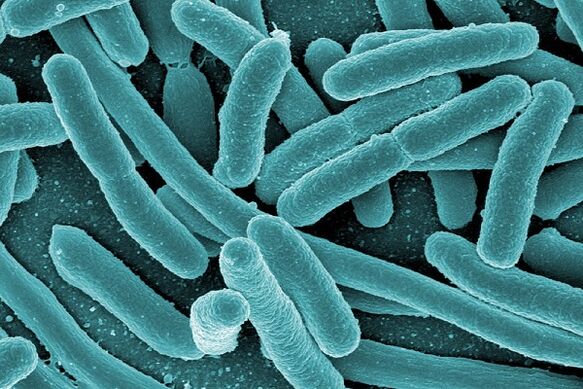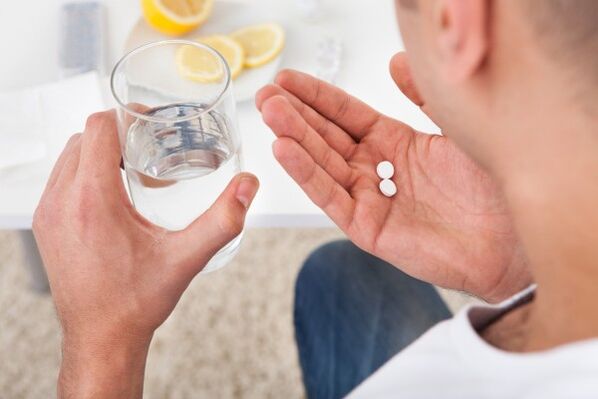In medicine, infection refers to the infection of an organ or tissue with various microorganisms as well as parasites and certain insects. Therefore, infectious prostatitis is an inflammation of the prostate caused by bacteria, viruses, or fungi.

The first group of microorganisms becomes the perpetrator more often. Consider the causes that can provoke an infection in the prostate, how the disease will manifest, and how it can be treated in men.
Causes of infectious prostatitis
A healthy person has a defense mechanism against various foreign organisms - the immune system. If this mechanism fails or conditions are created under which infections are stronger than immunity, the tissue of the prostate becomes infected, leading to an inflammatory process and unpleasant symptoms.
Infectious prostatitis can be caused by:
- Sex with an infected partner. Even if a woman has no visible symptoms of a sexually transmitted disease but has a pathogen, the man can become infected. Usually, urethritis first begins and then the urinary tract infection enters the prostate and causes inflammation of the prostate.
- The existing focus of the infection in the body. The pathogen can enter the prostate through blood flow to other organs in pneumonia, flu, caries and other diseases.
- Lifestyle characteristics. Alcohol, nicotine, lack of physical activity weaken the immune system, as a result of which bacteria living continuously on the skin and mucous membranes of the person become the culprits of the disease.
- Injuries. In the event of sports, fighting, or an accident, the perineum can exert a mechanical effect that leads to damage to the tissues of the prostate and can cause an infectious form of the disease.
- Hypothermia. Due to the low ambient temperature and subsequent freezing, the immune system may not be able to cope with the bacteria that have entered the body.
Infection of the prostate is possible with certain medical procedures and surgeries. For example, prostatitis can be triggered by catheterization that has been performed in violation of all rules and regulations. In this case, urethritis develops first, and only then is there a complication of prostatitis. In addition, the disease may be a complication of biopsy.
Sexually transmitted infections are the most dangerous to men's health.

Symptoms of the infectious form
Infectious prostatitis is always acute, the symptoms appear unexpectedly to the patient, get worse quickly and are a cause for serious concern. It is impossible to ignore the signs of this disease.
Men go to the doctor with the following complaints:
- Sharp, often throbbing pain between the anus and the eggs. It can be "given" to the genitals, lower back or abdomen.
- Rise in body temperature to 38-39 degrees, fever, chills. The temperature in the rectum can be raised and it can be kept within the normal range in the armpit.
- Frequent urination and urination, especially at night.
- Pain when urinating, intermittent urination, burning sensation in the urethra.
- Weakness, nausea, loss of appetite, muscle or joint pain.
- Stool problems - constipation or pain during defecation.
- Decreased libido, slow erection, painful ejaculation.
If a man is in no hurry to see a doctor and suffers from pain, or tries to treat himself with antibiotics and folk remedies on his own, the pain and urinary tract disorders may go away after a certain amount of time. The illusion of recovery arises. In fact, the infection did not go away and the acute form of prostatitis developed to chronic. This means that from time to time a man will get worse and there is a risk of developing infertility.
Infectious prostatitis can cause sepsis and the death of the patient, so there is no time to waste to deal with the pathology on its own.
Modern diagnostic methods
The clinical picture is so emphatic that the doctor can make a correct diagnosis based on the symptoms listed above. In addition to the typical complaints, the anamnesis received at the reception is also taken into account - so it is important to contact a health care facility in a timely manner.
To choose the right treatment tactics, it is important to have a better understanding of what is happening in the body and what pathogen is causing the pathology. Therefore, a certain amount of testing is required in this case.
During the appointment, the doctor will perform the following activities:
- It measures body temperature in the anus and armpit (in the case of infectious acute prostatitis, there will be a deviation of up to 0. 5 ° C).
- Check the condition of the lymph nodes in the pelvic region.
- Feel the lower abdomen, the perineum, the lower back.
Prostate massage with this form of the disease is not done due to pronounced pain. In addition, such manipulation can trigger the transmission of infection from the gland to other organs and systems, which is likely to cause death later on. Even the suspicion of infectious prostatitis is a contraindication to such procedures.
Laboratory tests of blood, urine and bacterial cultures are important. They can help determine the type of pathogen and confirm the inflammation.

Among the instrumental methods, TRUS, CT, MRI, uroflowmetry (to determine the rate of urine output) and other methods may be used at the discretion of the treating physician. In most cases, transrectal ultrasound in combination with laboratory methods and medical history is sufficient. CT or MRI is performed when a tumor is suspected or in doubt.
Modern management principles
If there are no clear signs of body poisoning, treatment is allowed at home. Otherwise, hospitalization, intravenous infusion of antibacterial agents, and increased monitoring by medical personnel will be required. In both cases, the sick person needs bed rest - even mild physical activity can provoke the spread of the infection through the bloodstream.
The treatment of patients aims to achieve two goals: to overcome the pathogenic microflora and to improve general well-being. Overall, the goal of this movement is to prevent death or complications.
Fight against infection
If laboratory tests show that infectious prostatitis is caused by bacteria (which is the most common), the use of antibacterial agents should become the basis of therapy. If only one such treatment is started, the improvement in well-being will occur after 2-3 days. However, this requires proper drug selection. The duration of the medication is also important - it can be up to a month, depending on the medication and the extent of the prostate damage. Treatment cannot be interrupted.
In addition to the type of pathogen, the doctor needs to consider a few other factors.
- Individual characteristics of the patient, condition of the heart, liver and kidneys.
- If possible, choose a stronger drug, pushing such bacteriostatic agents into the background.
- The effect of antibacterial therapy should be bactericidal, that is, it should be aimed at killing the pathogen, not at stopping its development in the tissues of the prostate gland.
For these reasons, infectious prostatitis alone cannot be treated. In the absence of medical qualifications and skills to interpret diagnostic measures, it is almost impossible to select the right antibacterial agent. Delays, such as improper handling in this case, can come to life.

Symptomatic treatment
The intensity of the pain of infectious prostatitis is such that conventional analgesics and antispasmodics may be useless. In such exceptional cases, your doctor may prescribe drugs to relieve the pain during a short course of treatment.
Can also be assigned to:
- Diuretics (if there is no acute urinary retention) to prevent cystitis.
- Laxatives (if you have constipation) to relieve prostate pressure.
- Non-steroidal anti-inflammatory drugs.
- Alpha-blockers - to normalize the urinary process.
- Muscle relaxants to relieve spasms of the pelvic floor muscles.
If acute urinary retention has occurred during infectious prostatitis, a urinary catheter may be inserted into the patient.
If it becomes apparent during therapy that the patient's well-being is not improving, this may warrant further TRUS to rule out a possible prostate abscess. In case of doubt, a biopsy of the prostate tissue may be performed. If the diagnosis is confirmed, the sick person undergoes emergency surgery to open and empty the abscess. Antibiotic therapy will not be discontinued in this case.
Risk of infectious prostatitis
If a man sees a doctor in time and does not break his prescriptions, recovery will almost always happen. In some variants of the event, the transition to chronic form or chronic pelvic pain syndrome (CPPS) may occur.
Other likely consequences:
- pyelonephritis or cystitis;
- blood poisoning;
- formation of fistulas.
Infectious prostatitis responds well to treatment if started early. To do this, one must listen to one’s health. If pain begins in the perineal region, with a concomitant rise in rectal body temperature and difficulty urinating, see a doctor immediately. Using folk remedies and following the advice of a friend or wife can end in disaster.
























